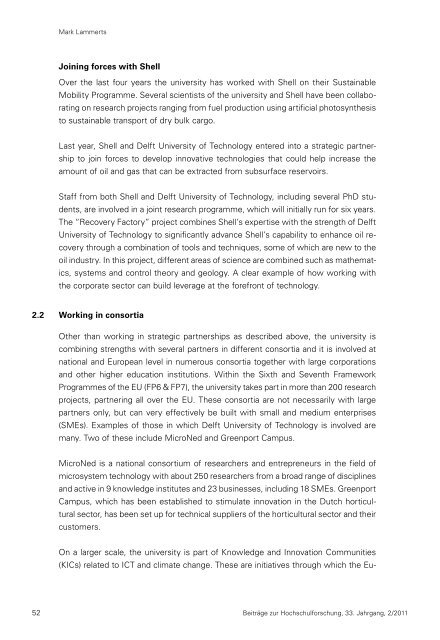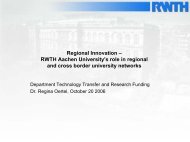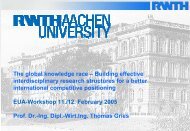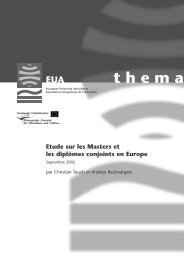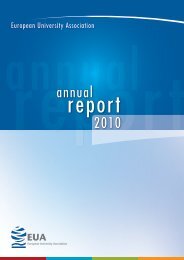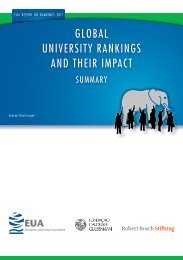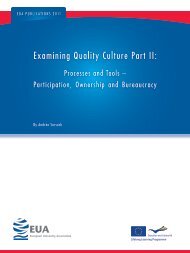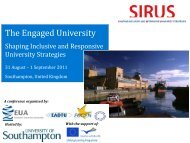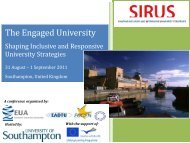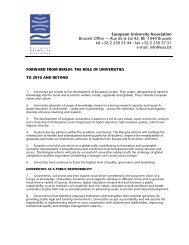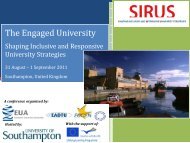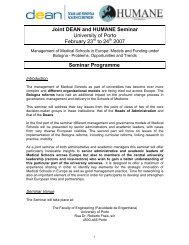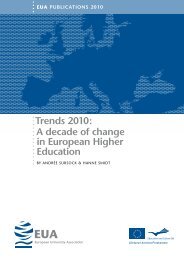Beiträge zur Hochschulforschung - European University Association
Beiträge zur Hochschulforschung - European University Association
Beiträge zur Hochschulforschung - European University Association
You also want an ePaper? Increase the reach of your titles
YUMPU automatically turns print PDFs into web optimized ePapers that Google loves.
52<br />
Mark Lammerts<br />
Joining forces with Shell<br />
Over the last four years the university has worked with Shell on their Sustainable<br />
Mobility Programme. Several scientists of the university and Shell have been collabo-<br />
rating on research projects ranging from fuel production using artificial photosynthesis<br />
to sustainable transport of dry bulk cargo.<br />
Last year, Shell and Delft <strong>University</strong> of Technology entered into a strategic partner-<br />
ship to join forces to develop innovative technologies that could help increase the<br />
amount of oil and gas that can be extracted from subsurface reservoirs.<br />
Staff from both Shell and Delft <strong>University</strong> of Technology, including several PhD stu-<br />
dents, are involved in a joint research programme, which will initially run for six years.<br />
The “Recovery Factory” project combines Shell’s expertise with the strength of Delft<br />
<strong>University</strong> of Technology to significantly advance Shell’s capability to enhance oil re-<br />
covery through a combination of tools and techniques, some of which are new to the<br />
oil industry. In this project, different areas of science are combined such as mathemat-<br />
ics, systems and control theory and geology. A clear example of how working with<br />
the corporate sector can build leverage at the forefront of technology.<br />
2.2 Working in consortia<br />
Other than working in strategic partnerships as described above, the university is<br />
combining strengths with several partners in different consortia and it is involved at<br />
national and <strong>European</strong> level in numerous consortia together with large corporations<br />
and other higher education institutions. Within the Sixth and Seventh Framework<br />
Programmes of the EU (FP6 & FP7), the university takes part in more than 200 research<br />
projects, partnering all over the EU. These consortia are not necessarily with large<br />
partners only, but can very effectively be built with small and medium enterprises<br />
(SMEs). Examples of those in which Delft <strong>University</strong> of Technology is involved are<br />
many. Two of these include MicroNed and Greenport Campus.<br />
MicroNed is a national consortium of researchers and entrepreneurs in the field of<br />
microsystem technology with about 250 researchers from a broad range of disciplines<br />
and active in 9 knowledge institutes and 23 businesses, including 18 SMEs. Greenport<br />
Campus, which has been established to stimulate innovation in the Dutch horticul-<br />
tural sector, has been set up for technical suppliers of the horticultural sector and their<br />
customers.<br />
On a larger scale, the university is part of Knowledge and Innovation Communities<br />
(KICs) related to ICT and climate change. These are initiatives through which the Eu-<br />
<strong>Beiträge</strong> <strong>zur</strong> <strong>Hochschulforschung</strong>, 33. Jahrgang, 2/2011


